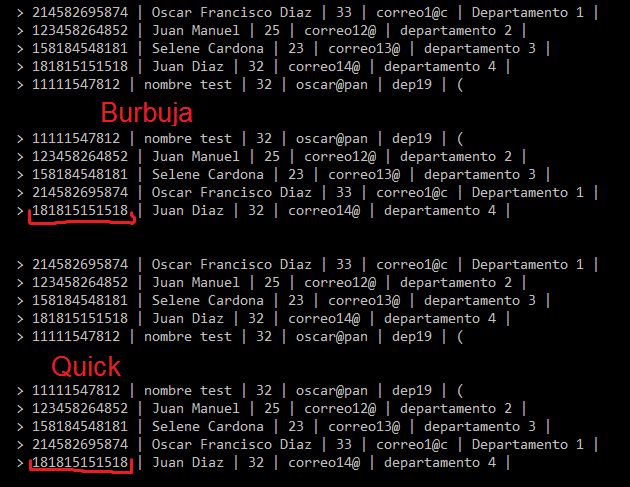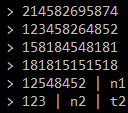Como actividad tengo que usar una lista doblemente ligada creada por mi, y de igual manera implementar un método burbuja para ordenar los valores.
Mi Nodo es el siguiente:
template<class T>
class NodoD{
private:
T dato;
NodoD<T> *sig;
NodoD<T> *ant;
public:
NodoD(const T &d){
dato = d;
sig = nullptr;
ant = nullptr;
}
template <class> friend class ListaDoble;
};
El método burbuja de la lista es:
template <class T>
void ListaDoble<T>::bubbleSort()
{
NodoD<T> *current = primero;
T dummy;
if (current == NULL) return;
if (current->sig == NULL) return;
int swapped = 1;
while (swapped){
current = primero;
//last pass unless there is a swap
swapped = 0;
while (current->sig != NULL){
//swapped ++;
if (current->dato > current->sig->dato){
swapped = 1; //swap, will need to re-enter while loop
//actual number swap
dummy = current->dato;
current->dato = current->sig->dato;
current->sig->dato = dummy;
}
current = current->sig;
}
if (swapped)
current = primero;
}
}
Lo que quiero ordenar son unos char*, la clase es la siguiente:
long int direccion;
char rfcProfe[13];
char estado[2];
Dado que son char, sobrecargue los operadores para poder comparar, convirtiendo todo el char a un entero:
bool Indice::operator ==(const Indice &i)
{
int rfc = std::atoi(rfcProfe);
int _rfc = std::atoi(i.rfcProfe);
return rfc == _rfc;
}
bool Indice::operator !=(const Indice &i)
{
int rfc = std::atoi(rfcProfe);
int _rfc = std::atoi(i.rfcProfe);
return rfc != _rfc;
}
bool Indice::operator <=(const Indice &i)
{
int rfc = std::atoi(rfcProfe);
int _rfc = std::atoi(i.rfcProfe);
return rfc <= _rfc;
}
bool Indice::operator >=(const Indice &i)
{
int rfc = std::atoi(rfcProfe);
int _rfc = std::atoi(i.rfcProfe);
return rfc >= _rfc;
}
bool Indice::operator <(const Indice &i)
{
int rfc = std::atoi(rfcProfe);
int _rfc = std::atoi(i.rfcProfe);
return rfc < _rfc;
}
bool Indice::operator >(const Indice &i)
{
int rfc = std::atoi(rfcProfe);
int _rfc = std::atoi(i.rfcProfe);
return rfc > _rfc;
}
Los datos ingresados son los siguientes: https://i.sstatic.net/xjXKw.png
Y los datos que obtengo al hacer el ordenamiento, son los siguientes: https://i.sstatic.net/vuh1b.png
EDIT: Use quicksort en mis lista, y de la misma manera el burbuja pero hay un elemento que no se ordena.
https://i.sstatic.net/poHs5.png



Indice? Me interesa echar un vistazo a los constructores y operadores de copia.